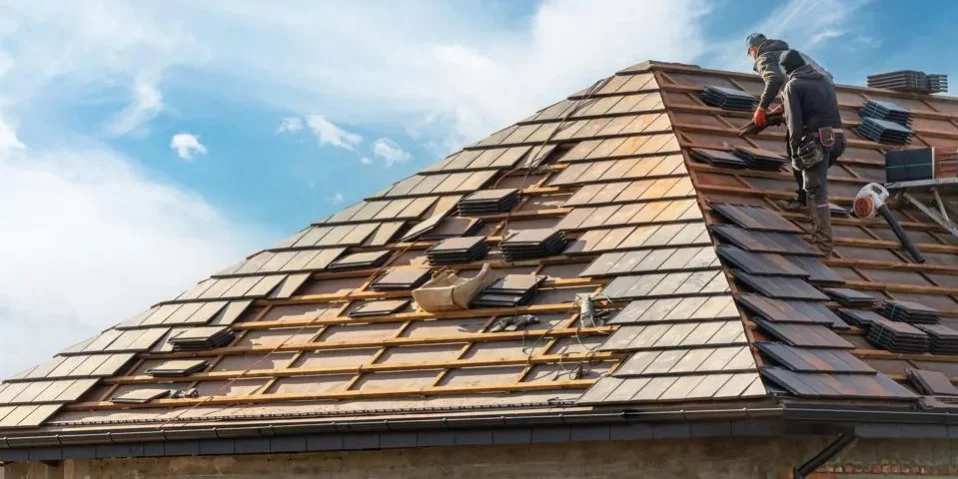When it comes to maintaining the integrity and safety of your home, replacing an old or damaged roof is among the most critical investments a homeowner can make. The residential roof replacement cost can vary widely, influenced by factors such as material choices, labor costs, and the size of your roof. This guide aims to demystify the costs involved, helping you make informed decisions for your home.
The Basics of Roof Replacement
When to Consider Roof Replacement
Understanding when to invest in a new roof is the first step in managing your residential roof replacement cost-effectively. Signs like missing shingles, frequent leaks, and visible wear are clear indicators. Most roofing materials offer a lifespan ranging from 20 to 50 years, depending on the material type and maintenance.
Types of Roofing Materials and Their Costs
The choice of roofing material has a significant impact on your overall residential roof replacement cost. Asphalt shingles, for example, are among the most affordable and popular options, costing an average of $5,000 to $10,000 for a standard-sized home. Metal roofing, while more expensive initially, offers durability and energy efficiency, with costs ranging from $10,000 to $25,000.
Understanding the Roof Replacement Process
The process typically involves removing the old roof, making any necessary repairs to the underlying structure, and installing the new roofing material. This process can take from a few days to over a week, depending on the project’s complexity and weather conditions.
Key Factors Influencing Roof Replacement Costs
Size and Complexity of the Roof
The larger and more complex your roof, the higher the residential roof replacement cost. Features like chimneys, skylights, and multiple levels can increase the labor required for your project.
Labor Costs
Labor can account for a significant portion of the total cost. Rates vary by region and contractor; therefore, it’s essential to get multiple quotes to understand the potential residential roof replacement cost for your area.
Removal of the Old Roof
The cost of removing and disposing of the existing roofing material can also add to the total. Some contractors will include this in their overall quote, while others may charge separately.
Additional Costs to Consider
Repairing Roof Damage
Before installing a new roof, any damage to the deck or structure must be addressed. These repairs can add to the residential roof replacement cost, depending on the extent of the damage.
Upgrading the Roofing Material
Opting for higher-quality materials can increase upfront costs but may offer better longevity and less maintenance, potentially saving money in the long run.
Permits and Inspections
Local building codes may require permits and inspections for a roof replacement, adding to the total cost. These requirements vary by location, so check with your local building department.
Budgeting for Your Roof Replacement
A well-planned budget is your best defense against the unexpected costs that can arise during roof replacement projects.
Estimating Your Total Costs
Start by obtaining estimates from several reputable contractors to get a clear picture of the residential roof replacement cost. Remember, the lowest bid isn’t always the best. Consider the contractor’s experience, the quality of materials, and the scope of work.
Setting Aside a Contingency Fund
Unexpected issues, like discovering rotten decking or needing to replace flashing, can increase the project cost. Setting aside a contingency fund of 10-20% of the total estimate can help you manage these unforeseen expenses without stress.
Financing Options for Roof Replacement
If out-of-pocket payment is not feasible, explore financing options. Many contractors offer financing plans, or you might consider a home equity loan or line of credit. Compare rates and terms to find the best fit for your financial situation.
How to Save Money on Roof Replacement
While a new roof is a significant expense, there are ways to mitigate the residential roof replacement cost without compromising on quality.
Choosing the Right Time of Year
Roofing contractors tend to be busiest in late summer and fall. Planning your replacement for the off-season—late winter to early spring—might secure you a lower rate.
Comparing Quotes from Multiple Contractors
Don’t settle for the first estimate you receive. Comparing quotes from multiple contractors can give you leverage for negotiation and help you find the best value.
Considering Long-Term Savings
Investing in higher-quality materials or adding insulation might increase the residential roof replacement cost upfront but can lead to significant savings on energy bills and maintenance costs over time.
Selecting a Roofing Contractor
The success of your roof replacement heavily depends on the contractor you choose.
What to Look for in a Roofing Contractor
Ensure your contractor has a valid license, insurance, and a solid reputation. Look for certifications from roofing material manufacturers, which can be an indicator of quality and expertise.
Questions to Ask Potential Contractors
Inquire about their experience with your chosen roofing material, request references from recent jobs, and ask about warranties on both materials and workmanship. Understanding their process and what’s included in the estimate can also help avoid unexpected residential roof replacement cost increases.
Understanding the Roofing Contract
A detailed contract should outline the scope of work, materials used, timelines, costs, and payment schedules. It should also mention how unforeseen costs will be handled. Read the contract carefully before signing to ensure it aligns with your expectations and budget.
The Impact of Roof Replacement on Home Value
A new roof can significantly enhance your home’s market appeal.
Increased Home Value
Not only can a new roof increase your home’s resale value, but it can also improve its curb appeal, making it more attractive to potential buyers.
Improved Energy Efficiency
Modern roofing materials are designed for better insulation and reflectivity, contributing to lower energy costs and increased comfort indoors.
Attractiveness to Buyers
Homes with a new roof typically sell faster than those with older roofs, as buyers appreciate the absence of an imminent expensive replacement.
Preparing for Roof Replacement
What Homeowners Need to Do
Prepare your home by ensuring clear access to your roof and protecting any valuable items in your attic from dust and debris. Inform your neighbors about the project, as it can be noisy and disruptive.
What to Expect During the Replacement
The replacement process can be loud and might slightly shake your home. It’s usually completed within a few days, depending on the weather and the project’s complexity.
Aftercare and Maintenance
Regular inspections and maintenance can extend your new roof’s lifespan. Keep gutters clean, trim overhanging branches, and address any minor issues promptly to avoid larger problems down the line.
Frequently Asked Questions (FAQs)
1. How much does it typically cost to replace a residential roof?
The cost of replacing a residential roof can vary widely based on several factors, including the size of the roof, the materials chosen, and labor costs in your area. On average, homeowners might expect to spend anywhere from $5,000 to $10,000 for a basic asphalt shingle roof on a typical home, with prices increasing for more durable or premium materials.
2. What factors most significantly affect the cost of a roof replacement?
Key factors influencing the cost include the type and quality of roofing materials, the roof’s size and pitch, any structural repairs needed, and labor costs, which can vary by region. Removing the old roof can also add to the expense.
3. Can I reduce the cost of my roof replacement?
Yes, there are several ways to potentially reduce costs, such as choosing cost-effective materials, comparing quotes from multiple contractors, and planning your replacement during the off-season when demand may be lower.
4. Is it worth investing in more expensive roofing materials?
Higher-quality materials often come with longer lifespans, better warranties, and improved energy efficiency, which can save money in the long run on repairs, maintenance, and energy bills. Consider your budget, climate, and how long you plan to stay in your home when deciding.
5. How long does a roof replacement take?
The duration of a roof replacement project can vary, generally taking anywhere from a few days to a week, depending on the roof size, material complexity, weather conditions, and any unexpected repairs.
6. Will a new roof increase my home’s value?
Yes, a new roof can significantly increase your home’s resale value, improve curb appeal, and make your property more attractive to potential buyers. It’s often considered one of the best home improvement investments for return on investment.
7. How do I choose the right contractor for my roof replacement?
Look for a licensed and insured contractor with good reviews, solid references, and experience with your chosen roofing material. It’s also wise to get multiple quotes and ask about warranties on both materials and labor.
8. Do I need a permit to replace my roof?
Most municipalities require a permit for roof replacement to ensure the project meets local building codes. Your contractor can often handle the permit process for you.
9. What should I do to prepare for my roof replacement?
Prepare your property by securing or removing loose items from your attic and yard, informing your neighbors about the project, and ensuring contractors have clear access to your roof.
10. How can I finance my roof replacement if I can’t pay out of pocket?
Several financing options are available, including home equity loans, personal loans, financing through your roofing contractor, or, in some cases, insurance coverage if the replacement is necessitated by damage covered under your homeowner’s policy.
Conclusion
Navigating the residential roof replacement cost requires thorough planning, from choosing the right materials and contractor to understanding the financing and potential impact on your home’s value. By following this guide, homeowners can approach their roof replacement project with confidence, ensuring they invest wisely in their home’s future.
Call to Action
If you’re considering a roof replacement, start by assessing your needs and budget, and then reach out to reputable contractors for estimates. With the right preparation, your new roof can enhance your home’s safety, efficiency, and aesthetic appeal for years to come.







